
April 2025: Logan passes his comps
Congratulations to Logan who passed his comprehensive examination for his PhD! The lab celebrated by going out for lunch and eating some tasty Dole Whip down at Caddy Bay!
December 2024: Hayley's poster wins second place!
The ALE lab went to Ottawa to participate in the Arctic Change Conference, hosted by Arctic Net. Hayley won second place in the Terrestrial Science division for her poster discussing her research on climate-driven vegetation change. Congratulations Hayley!
Read more about the AC2024 conference here.
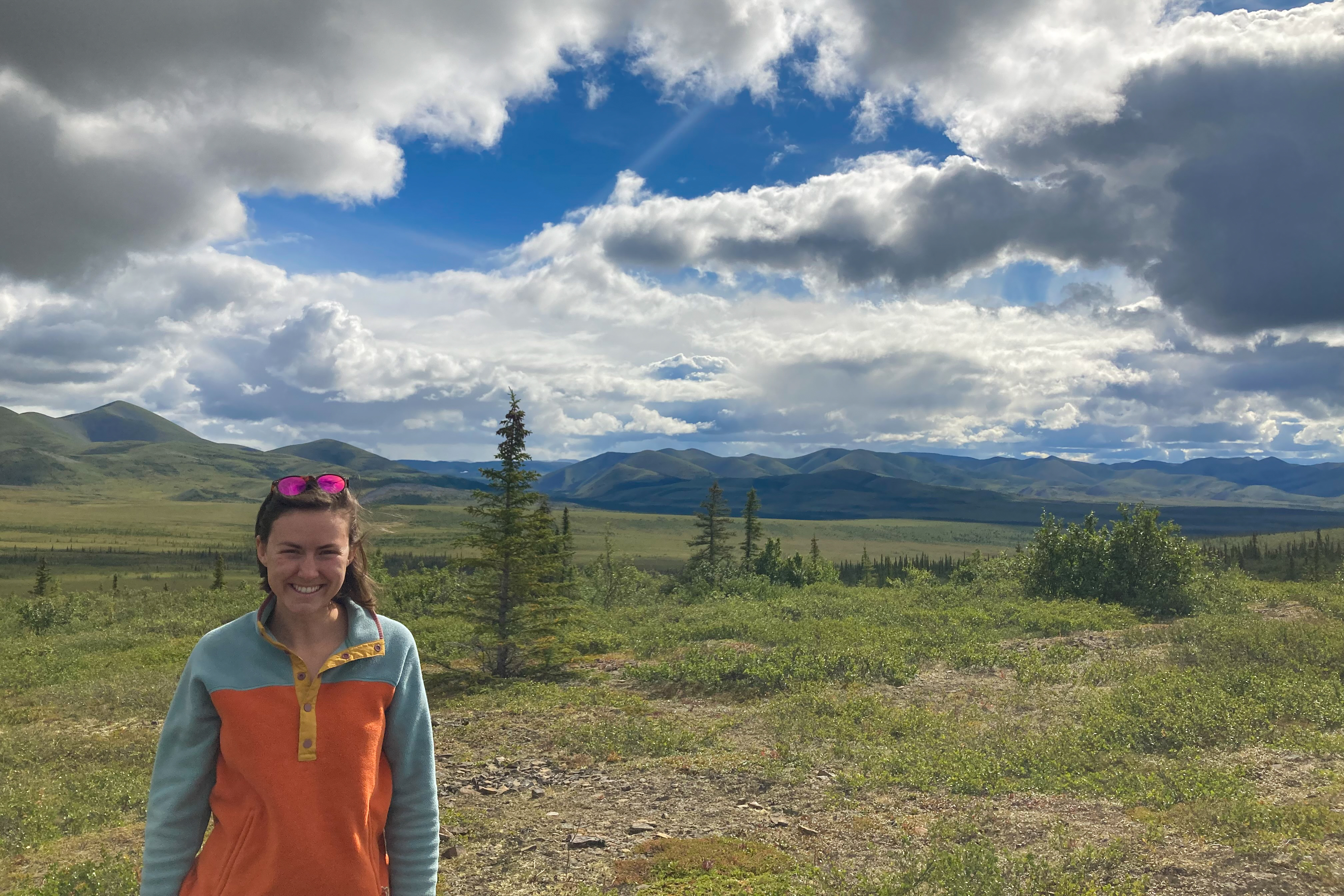
October 2024: Emma's research featured in Undark Magazine
Emma's collaborative research with Gwichi'in and Inuvialuit communities about permafrost dynamics has been featured in Undark Magazine! Irma and Ernie Francis, both Gwich'in knowledge holders living in Inuvik, are two collaborators that are also featured in this article.
Read the article here!
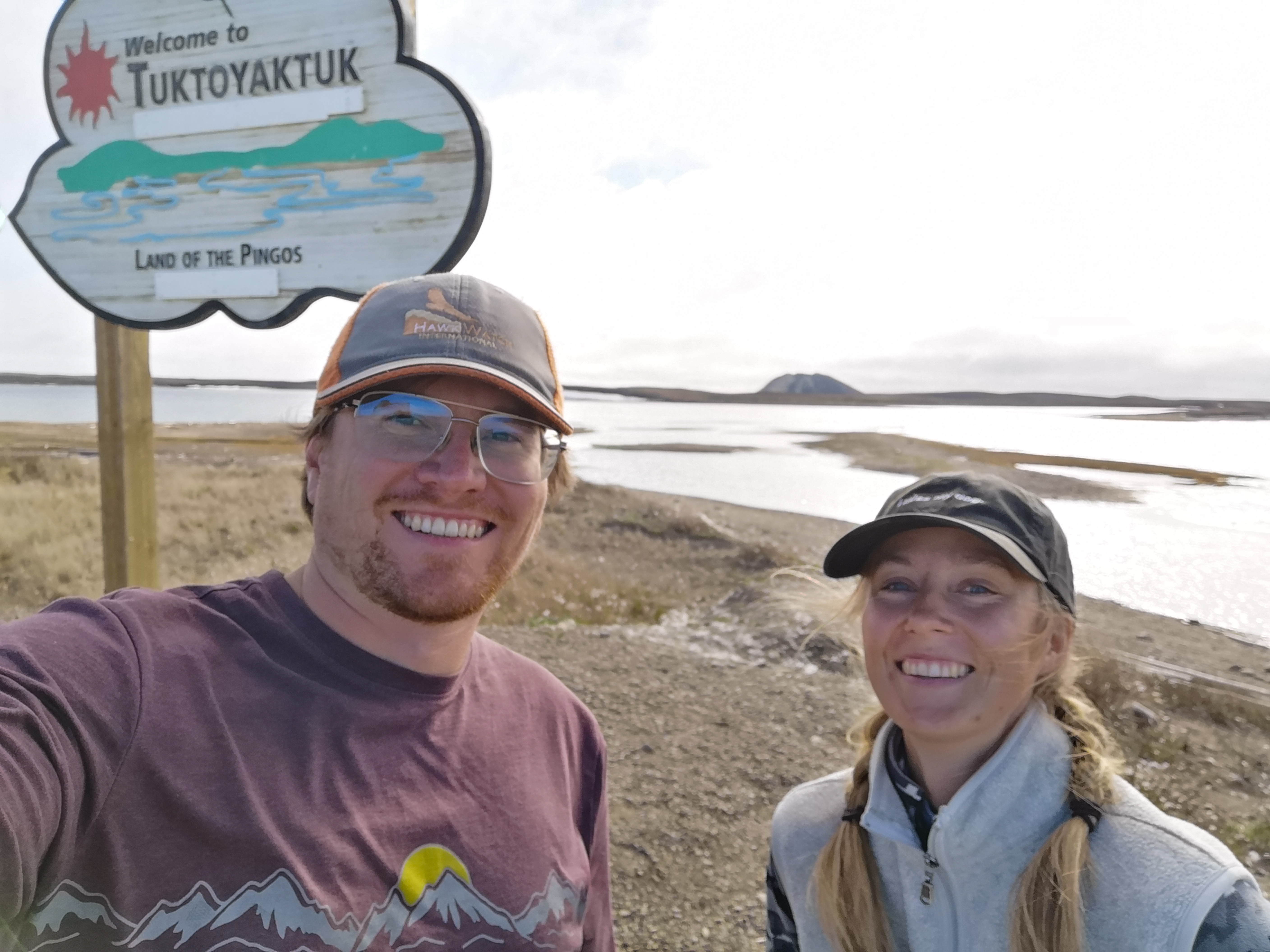
May 2024: Meghan & Logan receive Weston Family Awards
Congratulations to Meghan and Logan on winning their respective awards from Weston Family Awards in Northern Research! This funding will allow for the continuation of Meghan's research involving the effects of climate change and anthropogenic impacts on tundra plant communities and carbon storage as well as Logan's research on ecological consequences of thawing permafrost, focusing on how it affects wildlife habitats.
Read more about the award winners here!
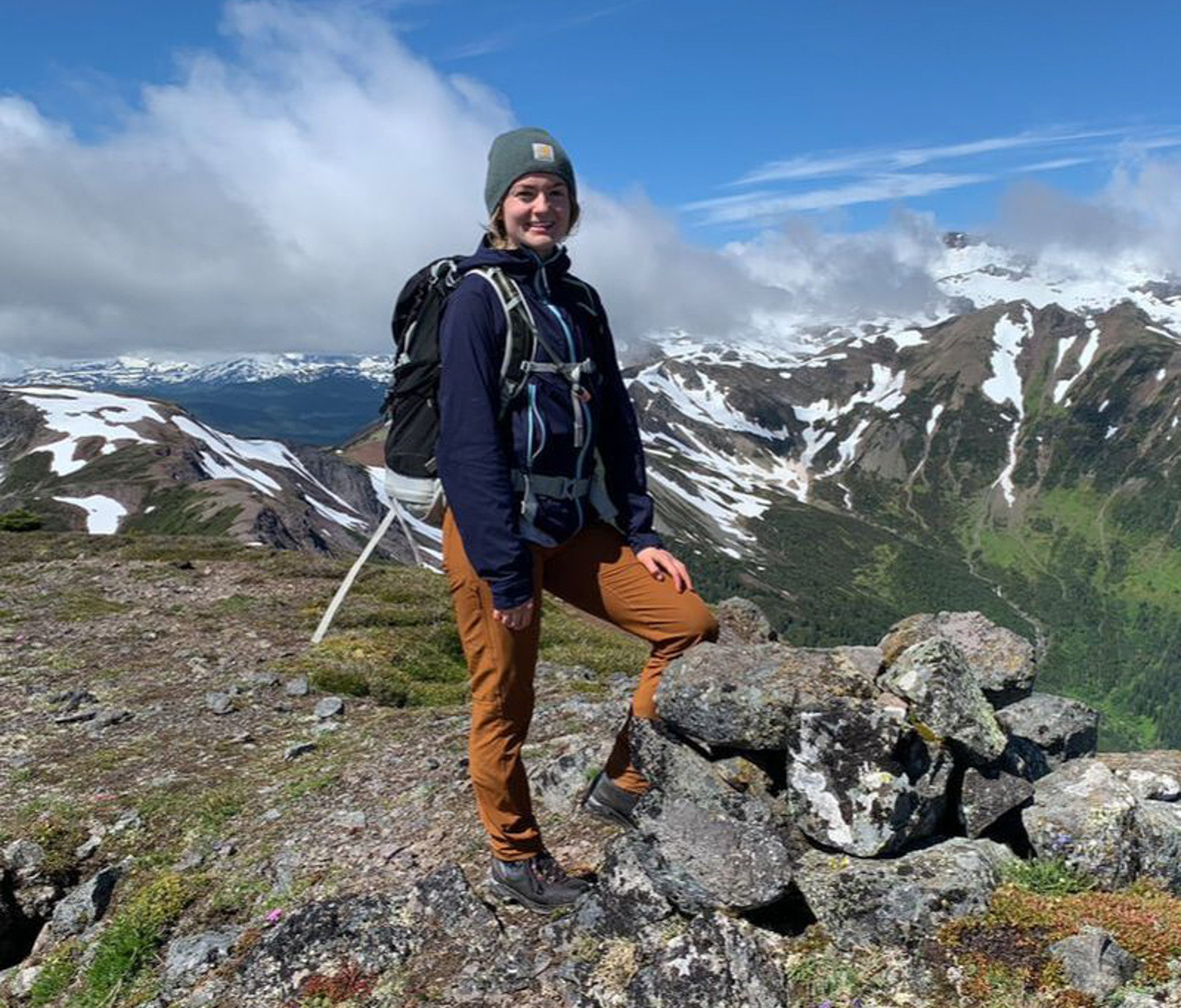
April 2024: Sydney defends her thesis
In early April, Sydney successfully defended her MSc thesis. Sydney's research focused on population demographics and community ecology of divii (Dall’s sheep) in the Northern Richardson Mountains of the Northwest Territories. Congratulations, Sydney!
Read Sydney's thesis here!
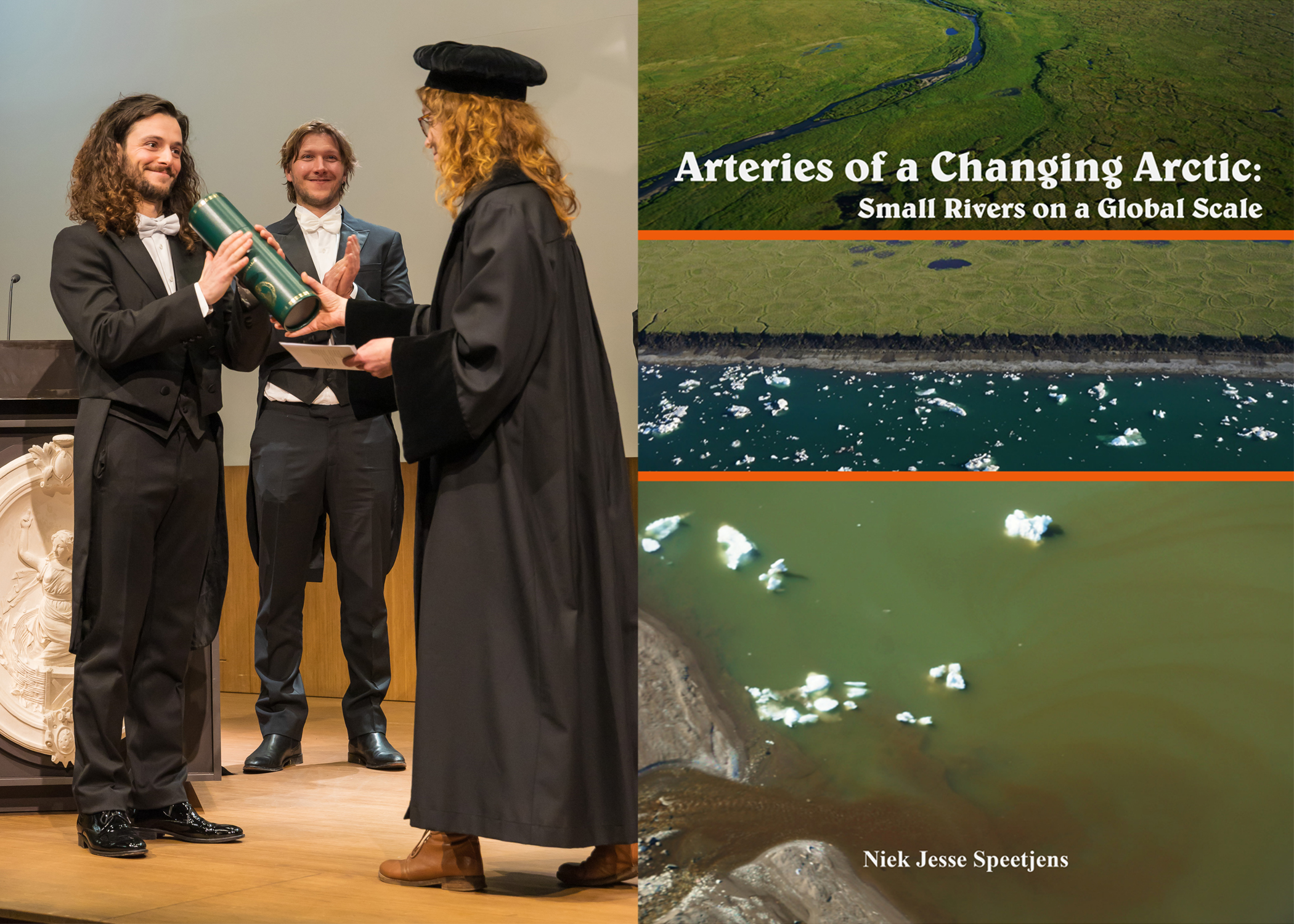
March 2024: Niek defends his PhD
Congratulations to Niek who victoriously defended his PhD this spring! Niek's thesis focused on understanding land-ocean fluxes of permafrost organic matter within the Arctic region under the pressure of climate change.

June 2023: Lawnbowling!
The ALE Lab tried their hand at lawnbowling this June at the Canadian Pacific Lawnbowling Club in Victoria!
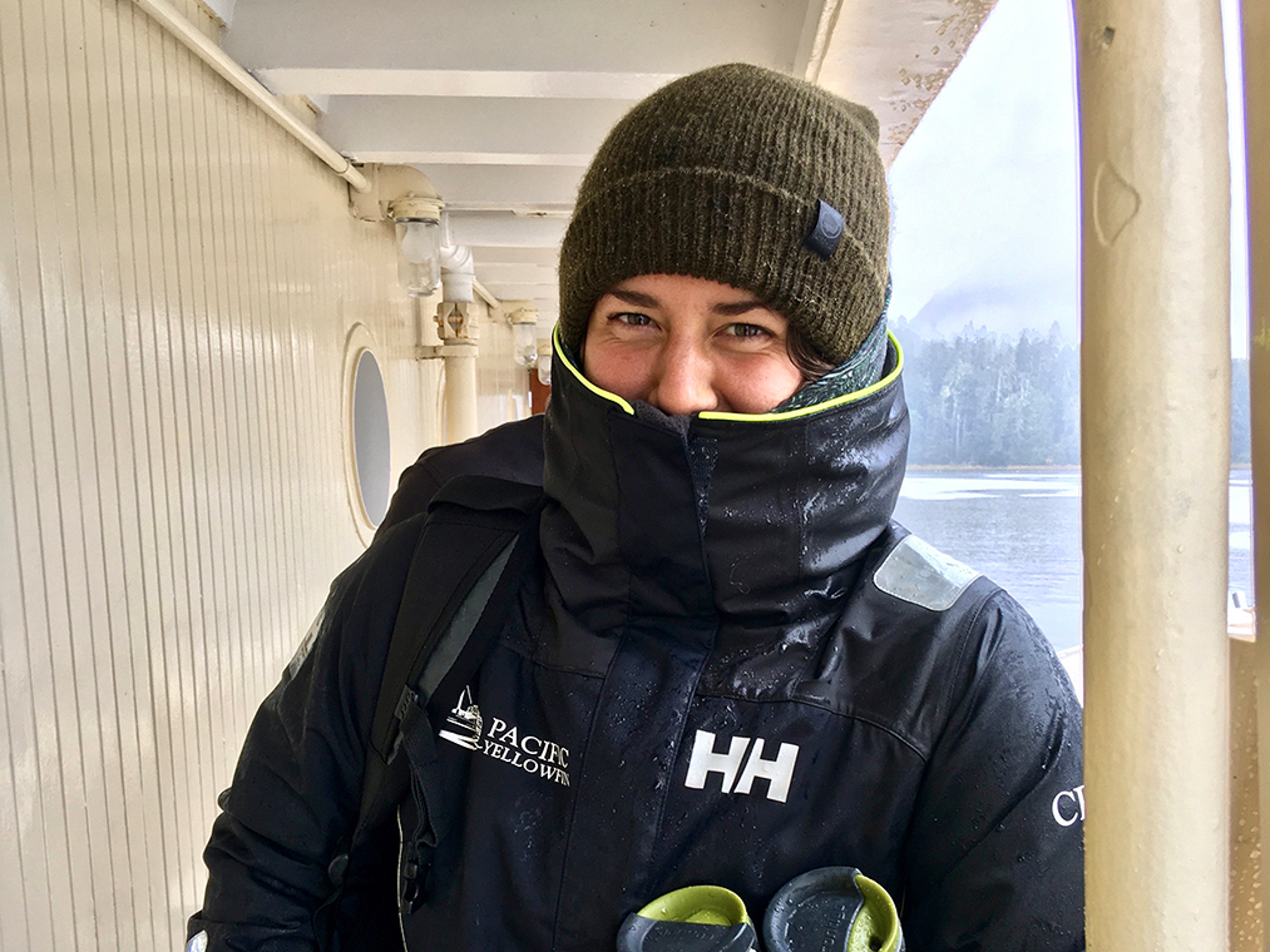
April 2023: Nicola defends her thesis
Congratulations to Nicola on her succesful MSc defense. Nicola's research marine storm surges in the Beaufort Delta and their effects on Arctic shorebird habitat. Well done!
Read Nicola's thesis here!
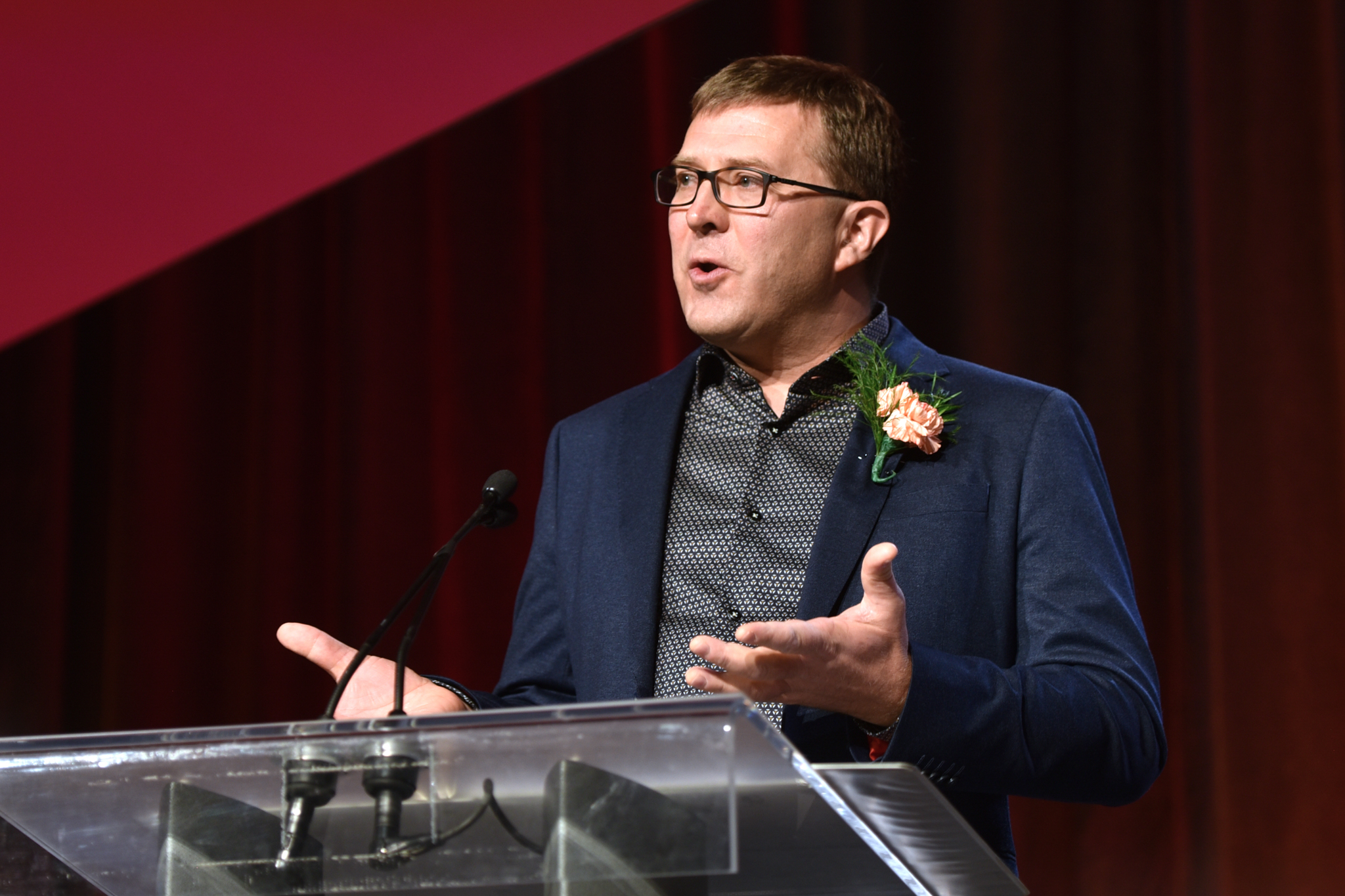
October 2022: Trevor elected to RSC
Trevor was elected to the Royal Society of Canada as a new member of the College of New Scholars, Artists and Scientists. As a result of demonstrating research excellence, he is elected to the board for the coming seven years. Congratulations, Trevor!
Watch a brief video about Trevor's research.

Summer 2022: Jordan departs
After 3+ years of having him on the team, it is bittersweet to say goodbye to Jordan as he moves on to new things. After completing his MSc, Jordan stayed on with the team as a research assistant. We wish you the best of luck in your future endeavours, Jordan!

October 2021: Jordan defends his thesis
We raised our glasses to toast Jordan on a successful MSc defense! Jordan's research investigated recent vegetation change in the Beaufort Delta Region. Congratulations, Jordan!
Read Jordan's thesis here!

October 2021: Zander defends his thesis
We shared a belated toast on the beach to celebrate Zander's MSc defense. In his research, Zander investigated Pacific salmon range expansion and shifting fishing opportunity in the Inuvialuit Settlement Region. Congratulations, Zander!
Read Zander's thesis here!

August 2021: Hana defends her thesis
Hana successfully defended her Masters thesis exploring changes in surface water dynamics across the Northwest Territories. We were able to come together to share a pint in person for the first time in a while. Congratulations, Hana!
Read Hana's thesis here!

October 2021: Funded MSc Opportunity
The Arctic Landscape Ecology Lab (UVic), the Northwest Territories Geological Survey, and the Geological Survey of Canada are seeking an MSc student to lead a research project exploring the terrain controls of thaw slump initiation.
More information is available here: MSc Opportunity.

October 2021: Funded PhD Opportunity
The Arctic Landscape Ecology Lab at the University of Victoria is seeking a PhD (or MSc) student to lead a project exploring vegetation change in the summer range of the Porcupine Craibou Herd.
More information is available here: PhD Opportunity.

October 2021: Funded MSc Opportunity
The Arctic Landscape Ecology Lab at the University of Victoria is seeking an MSc student to lead a project on community-based monitoring of landscape change.
More information is available here: MSc Opportunity.

September 2021: Funded PhD Opportunity
The Arctic Landscape Ecology Lab at UVic is seeking a PhD student to lead a research project exploring the recovery of tundra ecosystems following disturbance.
More information is available here: PhD Opportunity.

August 2021: Postdoctoral Researcher
The Arctic Landscape Ecology Lab at UVic and NSERC PermafrostNet is seeking a postdoctoral researcher to lead cross-scale synthesis activities exploring the determinants of thaw sensitivity in the Canadian Arctic.
More information is available here: PDF Opportunity.

December 2020: Angel successfully defends her MSc Thesis
This month, Angel successfully defended her Masters thesis that examined vegetation change due to climate change and fire in the western Canadian Arctic. We raised our cups and played a round of zoom jeopardy to celebrate!
Access Angel's thesis here!

December 2020: Postdoctoral Researcher Opportunity
The Arctic Landscape Ecology Lab and the Gwich’in Renewable Resources Board are seeking a postdoctoral researcher to contribute to projects exploring surface water change, permafrost landscape change, and their impacts on fishing livelihoods.
More information is available here: PDF Opportunity.

November 2020: Funded Masters Opportunity
The Arctic Landscape Ecology Lab at the University of Victoria is seeking a highly motivated graduate student for a project exploring local knowledge of muskox populations in the northern Yukon.
More information is available here: Masters Opportunity.

October 2020: Funded PhD Opportunity
The Arctic Landscape Ecology Lab at the University of Victoria is seeking a PhD student to join a team of researchers exploring permafrost thaw and its impacts on communities in the Western Arctic.
More information is available here: PhD Opportunity.

September 2020: Funded MSc Opportunity
The Applied Conservation Macro Ecology Lab and the Arctic Landscape Ecology Lab at the University of Victoria are seeking a highly motivated M.Sc. student to work on a research project focussed on Dall’s sheep population ecology in the Northern Richardson Mountains.
More information is available here: MSc Opportunity.

August 2020: Research Assistant Position
The Arctic Landscape Ecology Lab at the University of Victoria is looking for a motivated individual to assist in research focused on permafrost and vegetation change occurring in the Canadian Arctic. The successful aplicant will contribute to data management and analysis, and mapping and visualization projects.
More information on how to apply is available here: RA Opportunity.

July 2020: Funded PhD Opportunity
The Arctic Landscape Ecology Lab at the University of Victoria is seeking a PhD student to lead a research project exploring permafrost change in the Canadian Arctic. This project has two objectives: 1) to develop semi-automated mapping procedures to monitor permafrost landscape change and 2) to assess the biophysical determinants of terrain sensitivity by analyzing disturbance inventories created through mapping.
More information is available here: PhD Opportunity.

June 2020: Chanda has a paper published in Arctic Science
This month, ALE alumni Chanda Turner’s paper, ‘Muskrat distributions in a changing Arctic Delta are explained by patch composition and configuration’, was published in Arctic Science. This article explores habitat characteristics that influence the presence and distribution of muskrats in the heterogeneous landscape of the Mackenzie Delta. Click here to read the article.

June 2020: Tracey begins work at the Institute of Indigenous Peoples’ Health in Saskatoon
We sure do miss having Tracey in the lab but we are excited to announce that she has taken a new job in sunny Saskatoon! Tracey will begin work on June 15th at the Institute of Indigenous Peoples’ Health. The IIPH is part of the Canadian Institutes of Health Research and is housed at the University of Saskatchewan. Congrats Tracey!

May 2020: Tait completes her BSc in Biology and ES
Tait completed her Bachelor of Science this May with a double major in Biology and Environmental Studies. In lieu of a formal graduation ceremony, Tait was joined by friends and family via Zoom to celebrate. The surprise ceremony, put on by Tait’s roommates, involved a construction paper graduation hat, a home-made degree, and a lot of laughter.

May 2020: Tracey has a paper published in Human Ecology
This month, the first paper from Tracey’s MA was published in Human Ecology. This journal article explores how social-ecological changes including development and climate change are influencing access to fish in four Gwich’in communities in the Northwest Territories. It also highlights the importance of access to fish to well-being. Follow the link here to check it out.

May 2020: Hana and Zander receive the W. Garfield Weston Award
Another big congratulations to Hana and Zander on their success! Both Hana and Zander received W. Garfield Weston Awards to support their ongoing MSc research examining ecological change in Canada’s Arctic.

May 2020: Hana and Zander receive NSERC funding
A big congratulations to both Zander and Hana for receiving Canada Graduate Scholarships from NSERC for 2020! These scholarships will support Hana’s MSc research on drained lakes and Zander’s MSc research exploring the impact of salmon and climate change on subsistence fisheries in the Inuvialuit Settlement Region.

August 2019: Tracey successfully defends her MA thesis
This month, Tracey successfully defended her Masters thesis that examined socioecological change in the Gwich’in Settlement Region and the impact of change on access to fish and to Gwich’in well-being. Access her thesis here!

April 2019: Hana graduates from her BSc program and begins her MSc
Hana graduated from her BSc program with a major in Geography and a minor in Statistics. Following her hard work in the lab as a Research Assistant, we convinced Hana to continue with us as a Master’s student. She is already diving deep into her research focusing on lake drainage in the Beaufort Delta Region. Happy to have you on board Hana!

May 2019: Nicola and Jordan Receive NSERC Funding
Congratulations to Nicola and Jordan who both received Canadian Graduate Scholarships from the Natural Science and Engineering Research Council (NSERC) in support of their MSc research. Jordan’s research explores the determinants of tundra vegetation change in the Tuktoyaktuk Coastlands and Yukon North Slope while Nicola’s examines the effect of marine storm surges on the habitat of Arctic shorebirds in the Beaufort Delta region.

May 2019: Tracey and Trevor go to NYC for the Tracking Change Global Knowledge Symposium
Trevor and Tracey made their way to New York City this month to attend the Tracking Change Global Knowledge Symposium. This meeting highlighted recent research outcomes from the Mackenzie, lower Mekong, and lower Amazon River basins. As part of this meeting, Tracey presented at the United Nations Permanent Forum on Indigenous Issues. Follow the link here to watch the meeting.

January 2019: Kiyo publishes in Remote Sensing then defends his MSc Thesis
Kiyo successfully defended his thesis exploring changes in hydrology and vegetation on Banks Island. His analysis of the drivers of surface water declines was published in Remote Sensing in December and he is currently revising his chapter exploring vegetation change. We are excited to report that Kiyo has agreed to stay on for the summer to manage our field logistics. Kiyo's Remote Sensing article can be accessed here.

September 2018: MSc / PhD Opportunity
The Arctic Landscape Ecology Lab at the University of Victoria is seeking a graduate student to work on a research project exploring local knowledge of Pacific salmon in the western Arctic. The objective of this project is to document local knowledge of distributional shifts in salmon and the environmental conditions that may be influencing these changes.
To apply please send a statement of interest, your CV, and unofficial transcripts to Dr. Trevor Lantz (tlantz@uvic.ca). Questions can be directed to Dr. Trevor Lantz or Dr. Karen Dunmall (Karen.Dunmall@dfo-mpo.gc.ca). The application deadline is October 19, 2018 and the position is set to start in January of 2019. Applicants who are interested in the position, but are unable to start until September of 2019 are also encouraged to apply.
More information is available here: MSc / PhD Opportunity.

March 2018: Angel Chen receives the Lorraine Allison Memorial Scholarship
Angel has received the Lorraine Allison Memorial Scholarship for her research on how climate and fire trends are changing vegetation structure in the Western Canadian Arctic. This scholarship is from the Arctic Institute that was set up to honour Lorraine Allison, who loved the natural world and particularly the North and emphasizes the importance of research that is relevant and useful to northern communities.

March 2017: Living on Earth radio program interviews Trevor
Following the publication of “Climate-driven thaw of permafrost preserved glacial landscapes, northwestern Canada” in Geology, Trevor was interviewed on the weekly environmental news program Living on Earth. In his interview with Steve Curwood, Trevor discussed the implications of permafrost thaw in Northern Canada, the methodology of the study, and community concerns regarding ongoing thawing.
The radio segment and transcript can be found here. The paper can be accessed here.

March 2017: Trevor is interviewed for the Students on Ice blog
The mandate of the Students on Ice Foundation is to educate youth about the importance of the Polar Regions, and inspire and support subsequent sustainability initiatives. Trevor was interviewed by an alumni of one of the educational programs they offer, and a current Environmental Studies student, Elise Pullar. Throughout the interview, Elise and Trevor discussed how he first became interested in Arctic regions, the power of experiential learning, and the changes he has observed throughout the diverse landscapes of the Western Arctic.
The interview can be found here.
March 2017: Paige defends her Honours thesis
At the end of the final semester of her undergraduate degree, Paige defended her Honours thesis, “Representing Northern Indigenous Peoples in the Age of Climate Change: A Critical Analysis of An Inconvenient Truth and Qapirangajuq: Inuit Knowledge and Climate Change”. Her research focused on how documentary films represent Indigenous peoples' experiences of climate change in Arctic regions, within the context of ongoing colonial violence.

December 2016: Will publishes in ARCTIC
Following on the completion of his thesis, Will published a paper in ARCTIC. The paper details an assessment of disturbances on culturally important ecosystems in the ISR, using a cumulative distubance map, and models for nine future disturbance scenarios. The potential to conserve larges contiguous areas of land was explored using the conservation planning software Marxan.

November 2016: Nina Moffat completes her BA in Geography and Minor in Environmental Studies
After two years with the Arctic Landscape Ecology Lab, first as a directed studies student then as a research assistant, Nina has graduated! After wrapping up some work with spruce imagery and coastal flooding data, Nina will be hopping across the pond to Edinburgh in January. We can't wait to see where her travels take her, but we'll miss her hard work and big smile here in the lab.

October 24-28th, 2016: Fulbright Arctic Week
To conclude his 18-months as a Fulbright Arctic Initiative scholar, Trevor travelled to Washington D.C. to participate in Fulbright Arctic Week. Throughout the week, the seventeen scholars participated in policy meetings and public engagement events, culminating in a symposium at the National Academy of Sciences.
A video of Dr Lantz’s presentation on sea level rise and storm surges can be seen here.

August 2016: Nina publishes in Arctic, Antarctic, and Alpine Research
This month, Nina published a paper which used high quality repeat air photos to examine how vegetation cover has changed in the tundra ecosystems of the Tuktoyaktuk Coastlands between 1980 and 2013. The quality and extent of these photos allowed her to show that while changes in vegetation cover differed across different terrain types, dwarf shrub expansion and lichen decline were fairly consistent across the study area.
The article can be found here. A more comprehensive list of publications by members of the Arctic Landscape Ecology Lab can be found here.

April 2016: Emily publishes in Environmental Research Letters
Following the completion of her thesis in 2015, Emily contributed a paper to a focus issue of Environmental Research Letters, which centers around the causes and consequences of changes to Arctic and Boreal phenology, biomass, and productivity. Emily's paper focuses on how road construction and maintenance impact vegetation structure and biomass in the Peel Plateau.
The article can be found here. A more comprehensive list of publications by members of the Arctic Landscape Ecology Lab can be found here.

June 2016: Becky publishes in Environmental Research Letters
In June, Becky published a paper which examines the influence of climate and landscape factors on thaw slump dynamics. A variety of landscapes were studied, and their observations that the most rapid intensification of slump activity occurred in the coldest environment they studied, indicates that ice-cored landscapes in cold permafrost environments are highly vulnerable to climate change.
The paper can be found here. A news article discussing the paper can be found here.

March 2016: Paige Bennett gets elected to UVic Senate
A few weeks of absence from the lab due to campaigning have paid off, as Paige was elected to the UVic Senate as a Student Senator in the first week of March. Serving on the Senate and the sub-committee on Academic Planning, Paige hopes to make the administrative workings of the university more transparent, and more accountable to students.

December 7th-11th, 2015: Doug Esagok receives the Inuit Recognition Award at ArcticNet AMS, Vancouver
Doug Esagok received the Inuit Recognition Award for his involvement in Arctic research at the ArcticNet annual scientific meeting in Vancouver. Congratulations Dougie! Over the years Dougie has contributed his time, knowledge and guidance to everyone in the Arctic Landscape Ecology lab, and we are lucky to work alongside him.
An article on Dougie’s achievement can be found in the most recent edition of Inuktitut Magazine, which is available for download here.

December 3rd, 2015: Abra Martin defends her MSc thesis
On December 3rd, Abra defended her thesis, "Carbon Fluxes from High-Centred Polygonal Terrain in the Northwest Territories". After a celebratory lunch at the Grad House to raise "the defender", Abra has returned to the east, and will be starting law school at McGill University in the fall of 2016.

December 4th, 2015: Will Tyson defends his thesis
The next day, Will followed suit, defending his thesis entitled "Assessing the Cumulative Effects of Environmental Change on Wildlife Harvesting Areas in the Inuvialuit Settlement Region through Spatial Analysis and Community-based Research". In January will moved to Squamish to get closer to the snow and continue his work in Arctic research as a consultant.
September 25, 2015: Emily Cameron defends her thesis
Only a few short weeks into the fall semester, Emily defended her thesis, "Ecological Impacts of Roads in Canada’s North". Her research focused on how disturbances drive vegetation change in high-latitude ecosystems, and combined fieldwork with broad-scale GIS analysis. Emily is continuing to work closely with the lab, and also taking time to get outside.

June 2015: Chanda Brietzke receives a W. Garfield Weston Award for Northern Research
Chanda received a highly competitive and prestigious Garfield Weston Award (administered through the Association of Canadian Universities for Northern Science and the Wildlife Conservation Society Canada). Chanda’s research revolves around both local knowledge and scientific research methods, and will contribute to a better understanding of the factors affecting muskrat populations in the delta, and inform future management of this important resource. Congrats Chanda, and nice jacket!

April 2015: Trevor Lantz is named an Arctic Fulbright Scholar
Trevor was named a Fulbright Scholar within the Fulbright Arctic Initiative. The initiative creates opportunities for interdisciplinary collaboration, bringing together experts from the US, Canada, Denmark, Finland, Iceland, Norway, Russia and Sweden. Trevor is working specifically with scholars from the US, Canada, Denmark and Sweden, looking at circumpolar health and wellness.
An interview with Dr Lantz regarding the Fulbright appointment can be found here, and further information regarding the Fulbright Arctic Initiative can be found here.
Photo from the U.S. Department of State blog post regarding the first official meeting for Fulbright Arctic Initiative members.

March 2015: Chanda Brietzke receives the Lorraine Allison Memorial Scholarship
This month, Chanda received a scholarship from the Arctic Institute that was set up to honour Lorraine Allison, who loved the natural world and particularly the North. The scholarship emphasizes the importance of research that is relevant and useful to northern communities, and demonstrates a commitment to northern research. Chanda’s focus on both local knowledge and scientific fieldwork, with long term goals of informing and improving muskrat management, fit the bill perfectly.
.JPG)